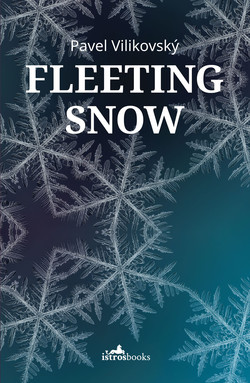Читать книгу Fleeting Snow - Pavel Villikovsky - Страница 29
На сайте Литреса книга снята с продажи.
Оглавление2.i
Like it or not, a mother leaves an indelible mark on her child. Even after she has gone she continues to be part of us – in my case, part of my shoulder. I’d had a birthmark there since I came into this world, it had just been sitting there quietly and without bothering me. The only person it bothered was Štefan, who called it a beauty spot. He is a linguist but that doesn’t mean he can make assumptions about my birthmark – he is free to call his own whatever he likes. The dictionary doesn’t distinguish between these two expressions, treating them as synonyms but for me a birthmark is linked to giving birth, birth certificate, birthday, practical, tangible things, whereas a beauty spot relates to something more abstract, idealized. Štefan and I got into an argument on this subject. Admittedly, I am just an amateur and he is an expert, though more in the field of bilabial consonants in the Menominee language than on the Slovaks’ relationship to their birth.
The birthmark couldn’t have cared less about our argument, it just did its own thing. All of a sudden it started to grow. It struck me as inappropriate at my age: after all, all of me – from head to toe – had stopped growing at the age of 18, so I assumed the birthmark would come to its senses. But it didn’t, and soon it was jutting out of my shoulder like an aerial. One day, as I anxiously checked on its progress, it started to speak to me out of the blue. ‘You think you’re the only one in the world this has happened to, that nobody before you had a birthmark that started growing?’
That was quite a challenge. To make sure the birthmark didn’t get out of control, I decided to do what other people before me had done. The surgeon to whose care I entrusted myself wasn’t endowed with the delicate, ascetic fingers of a violinist nor was he possessed of an incisive gaze that would, by itself, have removed my worn-out organs like a scalpel. He had the looks of a plump and kindly circus bear that loves the smell of damp sawdust and the little treats that life doles out. My birthmark didn’t frighten him at all and while I was undressing, perhaps partly to dispel my fear of the intervention, he drew me into a conversation about hobbies and pastimes such as football, Czech film comedies and music. He confessed that as a young man he had been a Pink Floyd fan, but that he also loved Ian Anderson.
Someone more clued up than I am might have guessed what was coming but I was genuinely taken by surprise. After the nurse had led me to the adjoining procedure room, made me lie down on the operating table and given me a Mesocain shot, strange sounds rang out from nextdoor and the doctor appeared on the threshold in his white coat holding a flute to his mouth. Before the injection took effect, he managed to play two easy pieces; I recognised the second, the folk song Kamaráti moji, tu ma nenechajte, pod lipku zelenú, pod lipku zelenú, tam ma pochovajte. The lyrics – Hey, my friends, don’t leave me here, under the green linden tree, under the linden tree, that’s where you will bury me – were tailor-made for an outpatients’ surgery.
During the procedure the doctor explained that although he had no ear or talent for music, he had decided to enrich his life by learning to play an instrument for his own delight and that of his patients.
‘Is this musical bandage included in my insurance cover?’ I asked. ‘Or do the patients have to contribute out of their own pocket?’
‘Oh no, it’s all free of charge. On the house.’ And to prove his point, while the nurse bandaged the wound, he gave an encore, El Condor Pasa, a favourite of the native Americans in our market-place. They are not Menominees though, they come from Peru.
Soon I was out of the surgery, minus birthmark. Now I was truly an orphan.
